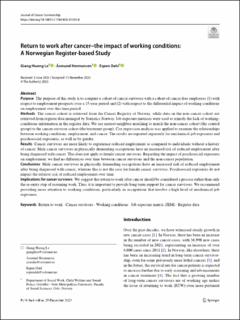Return to work after cancer–the impact of working conditions: A Norwegian Register-based Study
Peer reviewed, Journal article
Published version
Permanent lenke
https://hdl.handle.net/11250/3110048Utgivelsesdato
2023Metadata
Vis full innførselSamlinger
- Publikasjoner fra Cristin [3256]
- SAM - Institutt for sosialfag [471]
Sammendrag
Purpose The purpose of this study is to compare a cohort of cancer survivors with a cohort of cancer-free employees (1) with
respect to employment prospects over a 15-year period and (2) with respect to the differential impact of working conditions
on employment over this time period.
Methods The cancer cohort is retrieved from the Cancer Registry of Norway, while data on the non-cancer cohort are
retrieved from register data managed by Statistics Norway. Job exposure matrices were used to remedy the lack of working-
conditions information in the register data. We use nearest-neighbor matching to match the non-cancer cohort (the control
group) to the cancer-survivor cohort (the treatment group). Cox regression analysis was applied to examine the relationships
between working conditions, employment, and cancer. The results are reported separately for mechanical-job exposures and
psychosocial exposures, as well as by gender.
Results Cancer survivors are more likely to experience reduced employment as compared to individuals without a history
of cancer. Male cancer survivors in physically demanding occupations have an increased risk of reduced employment after
being diagnosed with cancer. This does not apply to female cancer survivors. Regarding the impact of psychosocial exposures
on employment, we find no differences over time between cancer survivors and the non-cancer population.
Conclusions Male cancer survivors in physically demanding occupations have an increased risk of reduced employment
after being diagnosed with cancer, whereas this is not the case for female cancer survivors. Psychosocial exposures do not
impact the relative risk of reduced employment over time.
Implications for cancer survivors We suggest that return to work after cancer should be considered a process rather than only
the re-entry step of resuming work. Thus, it is important to provide long-term support for cancer survivors. We recommend
providing more attention to working conditions, particularly in occupations that involve a high level of mechanical-job
exposures.

